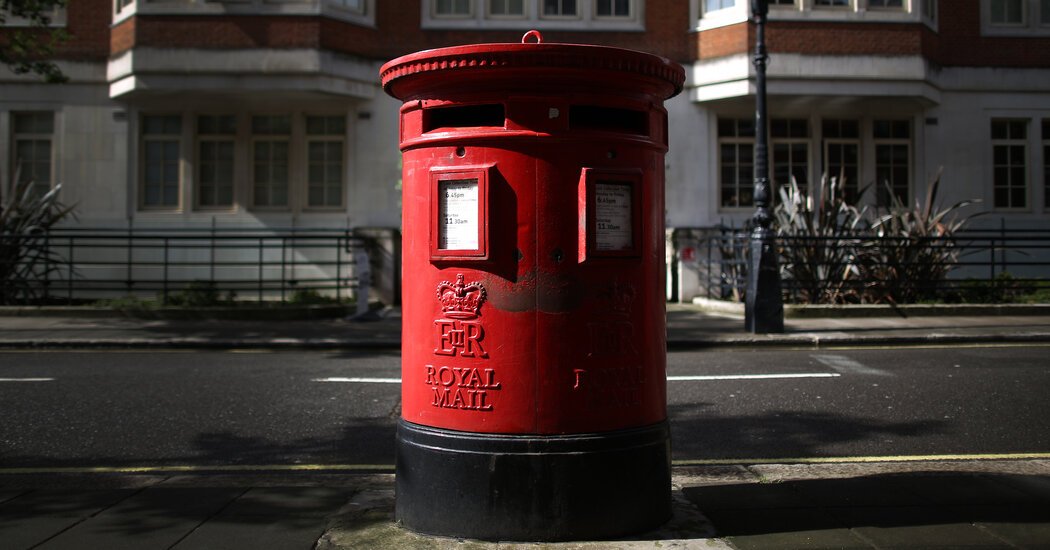Britain’s postal service could consider cutting deliveries to five days a week, or even three, from six, the country’s regulator said on Wednesday, drawing resistance from lawmakers and businesses.
The Royal Mail, like the U.S. Postal Service, has been increasingly plagued by service issues and financial pressures. Given rising costs, the organization risks becoming “financially and operationally unsustainable in the long term,” according to a report by Ofcom, Britain’s communications regulator.
Reducing delivery to just three days a week would save the Royal Mail up to 650 million pounds ($830 million) a year, the report found. Sweden, Norway, Denmark and Belgium have reduced the frequency of delivery or extended delivery times for letters in recent years, Ofcom said.
Lawmakers, however, pushed back on the idea. Prime Minister Rishi Sunak, whose Conservatives hold a majority, said on Wednesday that he remained “absolutely committed” to ensuring that the Royal Mail delivered six days a week. The service, which was privatized in 2013, is required by law to deliver mail six days a week, so any change would require a vote in Parliament.
Richard Thomson, a member of Parliament for the Scottish National Party, said he opposed reducing the Royal Mail’s delivery days because many people, especially those in rural areas, depended on the postal service for transporting documents and delivering packages in a reliable, inexpensive way.
“What’s being proposed would eat at the very core of that assumption,” Mr. Thomson said. He added that privatization had left the Royal Mail on a path of putting the bottom line over customer service.
Letter volumes in Britain have halved since 2011, with more people sending emails and text messages instead of handwritten notes. But the post office is still part of the fabric of British life. Its history dates back more than 500 years, to when Henry VIII tasked his secretary with establishing a national postal network to carry his mail and that of the Tudor court. Charles I opened the postal service to the public in 1635.
Other services in Britain also face tight budgets. Persistent cuts to the National Health Service, a symbol of Britain’s welfare state, have left the service underfunded and understaffed. After more than a decade of low economic growth and wage stagnation, three quarters of people in Britain said they believed the country was becoming a worse place to live, up from 49 percent of people in 2011 who said things were getting worse, according to a poll by Ipsos.
Dave Ward, the general secretary of the Communication Workers Union, which represents postal workers, said in a statement on Wednesday that reducing delivery to just three days a week would destroy the Royal Mail as customers know it and would affect thousands of jobs. The proposal was “dead in the water,” he said.
Tina McKenzie, the policy chair of the Federation of Small Businesses, which represents small businesses and people who are self-employed, said a quarter of small businesses relied on the postal service, and scaling back services would disrupt the economy.
Ofcom, the regulator, said that reducing the number of delivery days without downgrading delivery targets, but did not provide details on how that would work. Under the new guidelines, a next-day service would still be available for urgent letters.
The Royal Mail, which recorded an operating loss of 419 million British pounds ($533 million) last year on an adjusted basis, said it expected to deliver four billion letters annually in five years, down from 20 billion letters nearly two decades ago.
Nick Read, the chief executive of the Post Office, a separate organization from Royal Mail, said in a statement on Wednesday that he agreed there should be a debate on how to modernize the postal service. Still, vulnerable people, older people and businesses depend on reliable letter service, he said, and “their needs must be considered in any review.”
In a poll for Ofcom, 79 percent of people said that some things would always need to be sent by post. Saturday deliveries were important to 58 percent of people, down from 63 percent in 2020, according to the survey of more than 2,000 British adults in October and November. (The U.S. Postal Service delivers only priority mail and Amazon parcels on Sunday.)
Britain’s Post Office has also been in the spotlight in recent weeks over a yearslong scandal in which hundreds of people who ran Post Office branches were wrongly accused of theft. An ITV series, “Mr. Bates vs. The Post Office,” which began airing on Jan. 1, dramatized the fate of postal workers who were pursued in courts between 1999 and 2015 for financial losses that never occurred.





